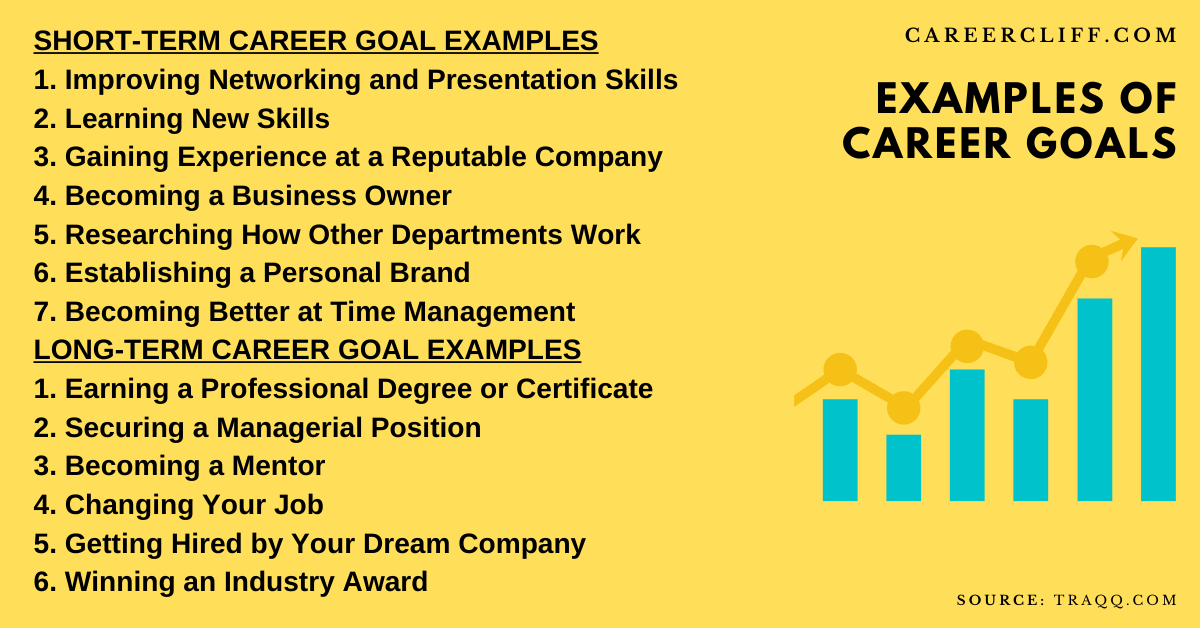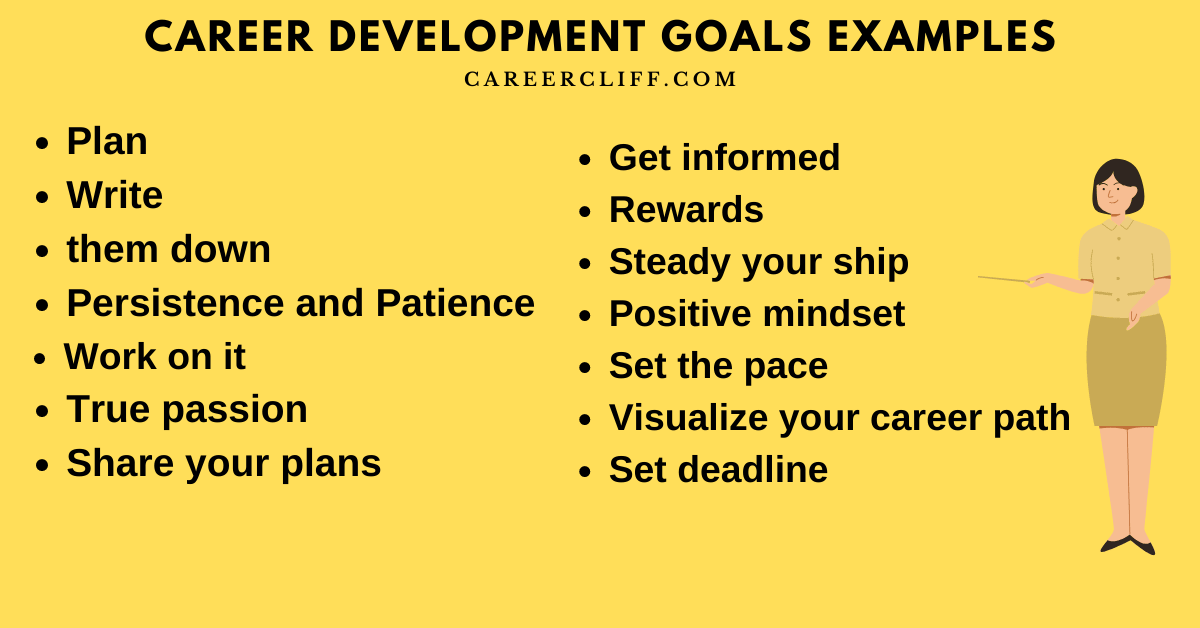Career Development Goals are like the roadmap to your dream job – they guide you through the twists and turns of professional growth. Get ready to dive into the world of setting goals and achieving greatness!
From short-term wins to long-term triumphs, we’ve got you covered with all the tips and tricks you need to take your career to the next level.
Career Development Goals

Setting clear career development goals is crucial for guiding your professional journey and ensuring you stay focused on your growth and success. Without clear goals, it’s easy to get lost or feel directionless in your career path.
Short-term Career Development Goals
- Complete a certification course in your field within the next six months.
- Gain experience by taking on a leadership role in a team project at work within the next three months.
- Improve your communication skills by attending a public speaking workshop within the next two months.
Long-term Career Development Goals
- Obtain a promotion to a managerial position within the next two years.
- Start your own business within the next five years.
- Attain a higher education degree in your field within the next seven years.
Setting and working towards these short-term and long-term career development goals can greatly impact your professional growth and success. They provide a roadmap for your career, help you stay motivated and focused, and push you to continually improve and advance in your chosen field. Remember, clear goals lead to clear results!
Creating SMART Goals

SMART goals are Specific, Measurable, Achievable, Relevant, and Time-bound objectives that can help individuals focus their efforts on what truly matters for their career development.
Step-by-Step Guide to Create SMART Career Development Goals
- Specific: Clearly define what you want to achieve in your career. Avoid vague goals and be precise about the outcome you desire.
- Measurable: Set criteria to measure your progress towards your goal. This could be quantitative or qualitative data that indicates success.
- Achievable: Ensure that your goal is realistic and attainable based on your current skills, resources, and timeline.
- Relevant: Align your goal with your overall career objectives and ensure that it is meaningful and contributes to your professional growth.
- Time-bound: Set a deadline for achieving your goal to create a sense of urgency and motivate yourself to take action.
Comparison of SMART Goals with Traditional Goal-Setting Methods
- Specific: Unlike traditional goals that may be vague, SMART goals are clear and specific, leaving no room for ambiguity.
- Measurable: SMART goals include measurable criteria to track progress, while traditional goals may lack quantifiable metrics.
- Achievable: SMART goals emphasize setting realistic objectives, whereas traditional goals may overlook feasibility.
- Relevant: SMART goals ensure that your efforts align with your career aspirations, while traditional goals may lack relevance to your overall objectives.
- Time-bound: SMART goals have a defined timeline for completion, unlike traditional goals that may lack a sense of urgency.
Skills Development: Career Development Goals
In today’s competitive job market, honing key skills is essential for career advancement and success. Continuous skills development not only helps individuals stay relevant in their field but also opens up opportunities for growth and advancement in their careers.
Identifying Key Skills
- Communication Skills: Effective communication is crucial for conveying ideas, collaborating with team members, and building relationships.
- Problem-Solving Skills: Being able to think critically and solve complex problems is highly valued in the workplace.
- Leadership Skills: Leadership abilities are essential for guiding teams, making decisions, and driving projects to success.
- Technical Skills: Proficiency in relevant technical tools and software is often necessary for specific roles.
Continuous Skills Development
Learning is a lifelong process, and investing in continuous skills development ensures that individuals remain adaptable and resilient in the face of changing job requirements.
- Take Courses and Workshops: Enroll in online courses or attend workshops to acquire new skills and knowledge.
- Seek Mentorship: Learn from experienced professionals in your field to gain valuable insights and guidance.
- Practice Regularly: Put your skills into practice through projects, volunteering, or side gigs to enhance proficiency.
Networking and Mentorship
Networking plays a crucial role in career development as it allows individuals to connect with professionals in their field, exchange ideas, and explore new opportunities. Building a strong professional network can open doors to job prospects, collaborations, and valuable insights.
Mentorship is another key component in setting and achieving career goals. A mentor can provide guidance, support, and valuable advice based on their own experiences. They can help navigate challenges, offer perspective, and push individuals to reach their full potential.
Building a strong professional network
- Attend industry events and conferences to meet like-minded professionals.
- Utilize social media platforms like LinkedIn to connect with professionals in your field.
- Join professional organizations and networking groups to expand your reach.
- Offer assistance and support to others in your network to build strong relationships.
- Follow up and stay in touch with contacts to maintain a lasting connection.
Finding a suitable mentor
- Look for someone who has achieved success in your desired field and shares similar values.
- Reach out to potential mentors with a clear ask and demonstrate your commitment to growth.
- Establish regular communication and set goals for the mentorship relationship.
- Be open to feedback, guidance, and constructive criticism from your mentor.
- Show gratitude and appreciation for the time and support your mentor provides.
Overcoming Challenges
In the pursuit of career development goals, individuals often encounter various challenges that can hinder their progress. These obstacles may include lack of resources, self-doubt, competition, and unforeseen circumstances. However, with the right strategies and mindset, it is possible to overcome these challenges and stay motivated to reach your goals.
Strategies for Overcoming Challenges, Career Development Goals
- Set realistic expectations: Break down your goals into smaller, achievable tasks to avoid feeling overwhelmed.
- Seek support: Surround yourself with positive and encouraging individuals who can provide guidance and motivation.
- Stay adaptable: Be open to adjusting your plans and strategies as needed to navigate unexpected challenges.
- Practice self-care: Take care of your physical and mental well-being to maintain resilience and focus during difficult times.
Real-Life Examples of Overcoming Challenges
- Michelle Obama: Despite facing racial and gender discrimination, Michelle Obama continued to pursue her education and eventually became the First Lady of the United States.
- Elon Musk: Elon Musk faced multiple setbacks and failures in his career but persevered to establish successful companies like Tesla and SpaceX.
- Oprah Winfrey: Oprah Winfrey overcame a challenging upbringing to become a successful media mogul, philanthropist, and advocate for education.

